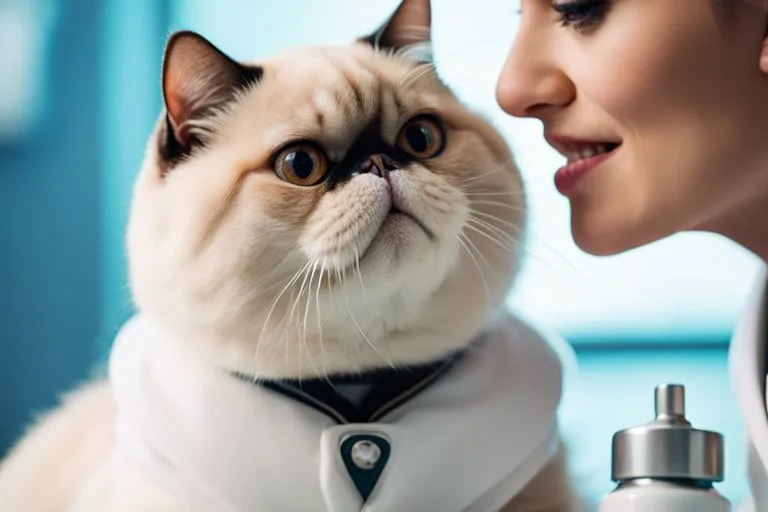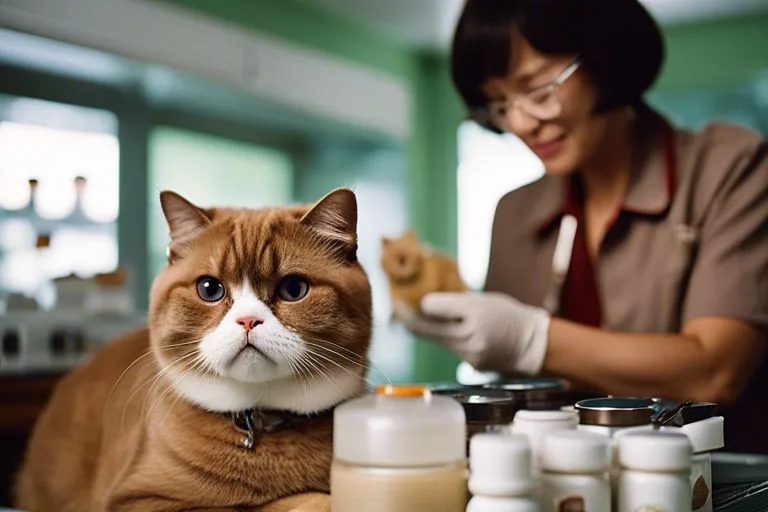Genetic testing is an essential tool in identifying potential health concerns in shorthair breeds, such as the British Shorthair. With advancements in veterinary medicine, there has been an increase in the availability of genetic tests that can detect various hereditary conditions specific to these breeds. Understanding which tests are pertinent and how to interpret their results can be pivotal in proactive healthcare management for these cats. But what are the most common genetic disorders in British Shorthairs and how can genetic testing help in identifying and managing these concerns? Let's explore the available genetic testing for British Shorthairs and the significance it holds in ensuring the health and well-being of these beloved feline companions.
Key Takeaways
- Genetic testing plays a crucial role in ensuring the health and welfare of Shorthair breeds.
- It allows for the identification of potential health concerns and inherited diseases specific to British Shorthairs.
- Responsible breeding practices can be implemented to reduce the prevalence of hereditary diseases through genetic testing.
- Understanding and interpreting genetic test results is essential for effective mitigation of hereditary health issues in Shorthair breeds.
Common Genetic Disorders in British Shorthairs
The British Shorthair breed is known to be susceptible to several common genetic disorders that require attention and consideration by breeders and owners. These disorders include hypertrophic cardiomyopathy (HCM), polycystic kidney disease (PKD), and hemophilia B. HCM is the most common heart disease in cats and has been identified in British Shorthairs. It is a genetic condition that causes the heart muscles to thicken, leading to potential heart failure or blood clots. PKD is another genetic disorder that affects the kidneys, leading to the formation of cysts and potential kidney failure. Hemophilia B is a blood clotting disorder that can lead to excessive bleeding and bruising. Identifying carriers of these genetic disorders through DNA testing can assist breeders in making informed breeding decisions to reduce the prevalence of these conditions within the British Shorthair population. Additionally, early detection through genetic testing can aid owners in proactively managing these health concerns, ultimately improving the overall welfare of British Shorthairs.
Available Genetic Testing for British Shorthairs
What are the available genetic testing options for identifying carriers of common genetic disorders in British Shorthairs? Genetic testing for British Shorthairs has advanced significantly in recent years, offering breeders and owners valuable insights into the genetic health of their cats. One of the most widely used genetic tests for British Shorthairs is for hypertrophic cardiomyopathy (HCM), a common heart disease in this breed. This test identifies the presence of the MYBPC3 mutation, which is linked to HCM in cats. Additionally, genetic testing for polycystic kidney disease (PKD) is available for British Shorthairs. This test detects the PKD1 mutation, enabling breeders to screen for carriers and ensure responsible breeding practices. Moreover, some laboratories offer genetic screening for other hereditary conditions such as progressive retinal atrophy (PRA) and feline infectious peritonitis (FIP). These tests empower breeders to make informed breeding decisions and help in the prevention and management of genetic diseases in British Shorthairs. As genetic testing continues to advance, it is crucial for breeders and owners to stay informed about the available testing options to promote the health and welfare of British Shorthairs.
Importance of Genetic Testing for Shorthair Breed
Advancing genetic testing capabilities have become an essential tool for ensuring the health and welfare of Shorthair breeds, providing valuable insights for breeders and owners. Genetic testing holds immense importance as it allows for the identification of potential health concerns and inherited diseases in Shorthair breeds. By understanding the genetic makeup of these cats, breeders and owners can make informed decisions to prevent, manage, or treat specific health conditions, ultimately leading to healthier and happier pets.
Genetic testing also plays a crucial role in maintaining the integrity of Shorthair breeds. It helps in the identification of genetic markers associated with desirable traits, allowing breeders to make informed choices and maintain the breed's standards. Additionally, genetic testing can aid in the responsible breeding of Shorthair cats, helping to reduce the prevalence of hereditary diseases within the breed.
Furthermore, genetic testing contributes to the overall advancement of veterinary medicine. The data obtained from genetic testing not only benefits individual cats but also contributes to broader research on feline genetics and inherited diseases. This research, in turn, can lead to the development of new and improved diagnostic tools and treatment options for Shorthair breeds.
Understanding Results of Genetic Testing
Understanding the results of genetic testing for Shorthair breeds is crucial for breeders and owners to make informed decisions regarding the management and prevention of potential health conditions and inherited diseases. Genetic testing provides valuable information about an individual dog's genetic makeup, particularly regarding the presence of disease-causing mutations. Interpreting genetic test results requires a comprehensive understanding of the specific genetic mutations associated with various health concerns in Shorthair breeds. It is essential to comprehend the implications of different result categories, such as clear, carrier, or affected, and how these outcomes may impact breeding decisions and overall healthcare management. Additionally, the mode of inheritance for specific conditions should be considered when interpreting results. Furthermore, consulting with a veterinarian or a professional geneticist can aid in the accurate interpretation of test results and the formulation of appropriate health management plans. In conclusion, a thorough understanding of the results of genetic testing is indispensable for Shorthair breeders and owners to effectively mitigate the risk of hereditary health issues and promote the overall well-being of these beloved animals.
Future Implications for Shorthair Health
Looking ahead, a comprehensive understanding of potential health implications is crucial for maintaining the well-being of Shorthair breeds. As genetic testing becomes more advanced, it will likely uncover new health concerns specific to Shorthair breeds. Identifying these potential health risks will be essential for developing targeted preventive care strategies and treatments. Additionally, ongoing research may reveal previously unknown genetic mutations or predispositions that could impact the health of Shorthair breeds. This information will be invaluable for breeders, veterinarians, and pet owners in making informed decisions about breeding practices, healthcare management, and disease prevention. Furthermore, the integration of advanced diagnostic technologies, such as whole-genome sequencing, may provide a deeper understanding of the genetic factors contributing to certain health conditions in Shorthair breeds. This could lead to the development of more precise and effective medical interventions. Overall, staying abreast of future implications for Shorthair health will be pivotal in promoting the long-term health and welfare of these beloved feline companions.
Frequently Asked Questions
Can Genetic Testing for British Shorthairs Also Detect Non-Genetic Health Concerns?
Genetic testing for British Shorthairs primarily focuses on identifying genetic health concerns. Non-genetic health concerns are typically diagnosed through physical examination, blood tests, and other diagnostic procedures, rather than genetic testing.
Are There Specific Environmental Factors That Can Impact the Health of British Shorthairs?
Specific environmental factors such as diet, exercise, and exposure to toxins can impact the health of British Shorthairs. Proper nutrition, regular physical activity, and minimizing exposure to harmful substances are essential for maintaining their overall well-being.
What Are Some Common Misconceptions About Genetic Testing for Shorthair Breeds?
Common misconceptions about genetic testing for shorthair breeds include oversimplification of results and misunderstanding of the impact of specific genetic markers. It is crucial to consult with a veterinary geneticist to accurately interpret and apply test findings for informed health management.
Are There Any Ongoing Research Studies Focused on Improving the Health of British Shorthairs?
Ongoing research studies dedicated to improving the health of British Shorthairs are essential for identifying and addressing breed-specific health concerns. These studies aim to enhance our understanding of genetic predispositions and develop targeted health management strategies for the breed.
How Can Breeders and Owners Work Together to Improve the Overall Health of the British Shorthair Breed?
Breeders and owners can collaborate to enhance the overall health of the British Shorthair breed through proactive health screening, genetic testing, regular veterinary check-ups, and adherence to breed-specific health guidelines. Open communication and sharing of health data are pivotal.
Conclusion
In conclusion, genetic testing plays a crucial role in identifying and managing health concerns in British Shorthairs. Despite the availability of such testing, the future implications for the health of this breed remain uncertain. It is ironic that while genetic testing offers hope for addressing potential health issues, it also highlights the complexity and challenges associated with managing the health of shorthair breeds.




